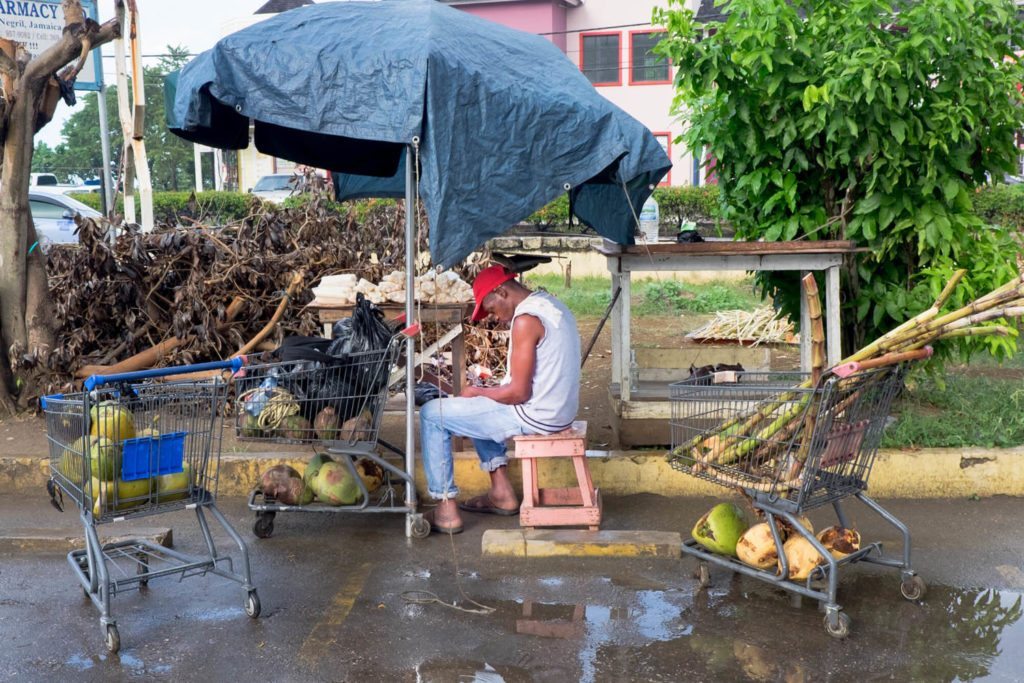19 Dec EMBRACING CULTURE SHOCK

I’d like to think of myself as a cultured person.
I have traveled to many countries around the world as a filmmaker, working on projects. When working in poorer situations I always had a hotel with amenities I used as a home base. Something that would separate me from the local living conditions. We are not doing this on our journey.
There is a difference between living among poverty, and looking through a lens at it. Â
I, like many others, think of Jamaica as an island paradise, where you go to escape, to enjoy the beaches, the Red Stripe, and the fun adventure activities. Our first stop in Jamaica was Negril, a big city that thrives on tourism. The popular Seven Mile Beach is lined with all inclusive resorts. Â Many tourists never leave their resort other than to and from the airport. Many of these resorts restrict locals from approaching their property and beaches in order to protect their guests.
Jamaica and it’s citizens are going through very tough times economically.Â
Hustling is everywhere. We were offered everything under the sun. Ganja was plentiful, as well as other drugs. We were offered to go to waterfalls at least 10 times in one hour. Other offers included woodwork, bracelets, bandanas, flags, and so much more.  Every local called to us, tried to push us into their shops, or even just sell us their story. The really intense hustlers gave us stories of how difficult their lives are and how much they need a few bucks to survive.  They would bring up their families, their children, anything that would generate enough sympathy that would get them some money. It was something incredibly unsettling to me, to see the fat white tourists at their resorts and the thin black locals trying to milk them for money. I just wasn’t prepared to see such contrast.
We opted to rent a room in White Hall, a neighborhood made up of a tangle of roads where thousands of locals live in Negril. Rum shacks at every corner that would blast music throughout the night. Most houses were unfinished or temporary structures converted to homes for large families. Many didn’t have running water or plumbing. Trash was everywhere and there were wafts of incredibly pungent smells.
The culture shock was intense. The first few days I just felt sad, I wondered what the point of life on earth was if you had people living like this. I was feeling sorry for people in these conditions and feeling ashamed for having grown up with many privileges. How could I go back and live my normal life, how could I enjoy this “paradise†knowing that there was so much destitution around every corner? Should I escape and check into an all-inclusive resort, drinking up all the drinks, and numb the reality away?
No, that is not this trip.
Isabelle and I spoke extensively on what I was feeling. She has had a lot more intimate connection with poverty stricken communities than I have through her many experiences volunteering and living around the world. She helped shed some light on how to move forward. The Being project was part of the conclusion; to show glimpses into real human experiences that we encounter along our travels. The collective and unique challenges, dreams, and fears of people living in the world today.
When I stopped feeling sad, I saw something reassuring in White Hall. People were smiling. Laughing. Raising families. Partying (and oh man, Jamaicans can PARTY). Even though their lives are difficult in many ways, life was thriving.
I am grateful for this intimate cultural exposure and it is just the first of many new perspectives shifts I am excited to experience along this journey.

